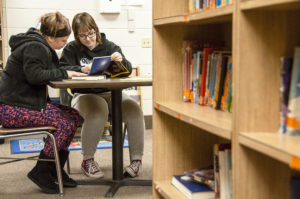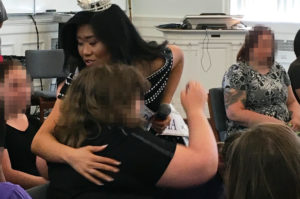Hoffman Academy Provides Nurturing Safe Space for Traumatized Children and Youth

Students at Hoffman Academy work on assignments.
For students at Hoffman Academy, the day school operated by the United Church of Christ’s Hoffman Homes for Youth in Littlestown, Pa., the normal day begins at 8 a.m. and the last class is dismissed at 2:30 p.m. But within those hours, the Academy is much more than just school.
The academy, which opened in 2015, is a private academic special education school for students in grades 1 through 12 who have social or emotional disabilities. Hoffman Homes “made the decision to start its own school to provide a quality education for its residents, instead of continuing to outsource the educational program,” says Walter Smith, vice president of educational services and principal of Hoffman Academy. “This change provided a crucial opportunity to infuse our curriculum with the tenets that are the foundation of therapeutic programming.”
As a certified Sanctuary Care provider, staff at Hoffman Homes and Hoffman Academy are recognized experts in treating children who are coping with the crippling effects of trauma. Additionally, faculty and staff receive monthly training on creating and maintaining trauma-sensitive classrooms.
The student body at Hoffman Academy is comprised of Hoffman residents and students from the surrounding community. Classes have no more than 12 students, and each class has a teacher and a teacher’s aide. Additionally, some 10-12 trained mental health workers are at the school at all times to assist as needed.

Each student is issued an iPad to help with homework and other class assignments.
The school emphasizes both creative arts and STEM skills (Science, Technology, Engineering, and Math), which focus on problem solving, analytical thinking and the ability to work independently: critical skills for the youth as they continue their education and move into the work force.
“Our students are issued an iPad for use during school,” says Smith, and they are encouraged to participate in Hoffman Homes’ creative therapies — music, art, equine, and pet.
An Innovation Space
Then there’s the MakerSpace, a newer concept in education that involves a collaborative workspace for making, learning, exploring and sharing. At Hoffman Academy, the students are encouraged to tinker, explore and experiment in the MakerSpace, using their ingenuity, imagination and teamwork to create.
While in the MakerSpace, students can work on such diverse projects as crafting towers out of spaghetti and marshmallows, building with Legos, or using a green screen to envision new ideas. The space has won Hoffman Academy national attention.
The MakerSpace uniquely meets the needs of Academy students, Smith says, and local school districts “have shared that they appreciate that we have the resources that they are not able to provide.”
Keys for Future

On a recent visit, Katie Schreckengast, Miss Pennsylvania 2017, spoke to students about her experiences as an adopted person.
Although Hoffman Academy is only in its third year, there already are success stories. Some of the school’s first graduates are pursuing college educations, and faculty and staff marvel at the progress made by other students.
“We’ve had students who engaged in severe behaviors and acts of physical aggression, kids who were able to learn coping skills from us that enabled them to successfully enroll in their public school upon discharge from Hoffman Homes,” Smith says.
But Hoffman Academy is always looking to the future. “We just recently expanded our technology program with the addition of TAPit, an interactive touchscreen learning platform,” says Smith.
The school also is continuing its ongoing partnership with local business leaders to provide job interviewing and job skill insights. And it’s in the early stages of developing a farm-to-table program with the support of a local chef and area farmers.
“We have a lot of great, unique things going on to make the school successful, engaging, and productive for our students,” Smith says. “It’s all good!”
Hoffman Homes for Youth was founded in 1910 through a bequest from George and Agnes Hoffman, devout members of the then-German Reformed Church, a predecessor body of the United Church of Christ. For decades, Hoffman Homes served orphans, then court-adjudicated youth. Since 1990, its primary mission has been to provide quality comprehensive psychiatric care and mental health counseling, creative therapies, a specialized education and a safe, healthy home to children in crisis.
Join Our Mailing LIst
Follow on Facebook
Iredell Adult Day Services Hosts Ribbon-Cutting to Celebrate Adult Day Health Certification - CHHSM
www.chhsm.org
Iredell Adult Day Services (IADS) in Newton, N.C. — a nonprofit organization dedicated to caring for older adults, vulnerable groups, and their families, and part of EveryAge — hosted a ribbon cut...